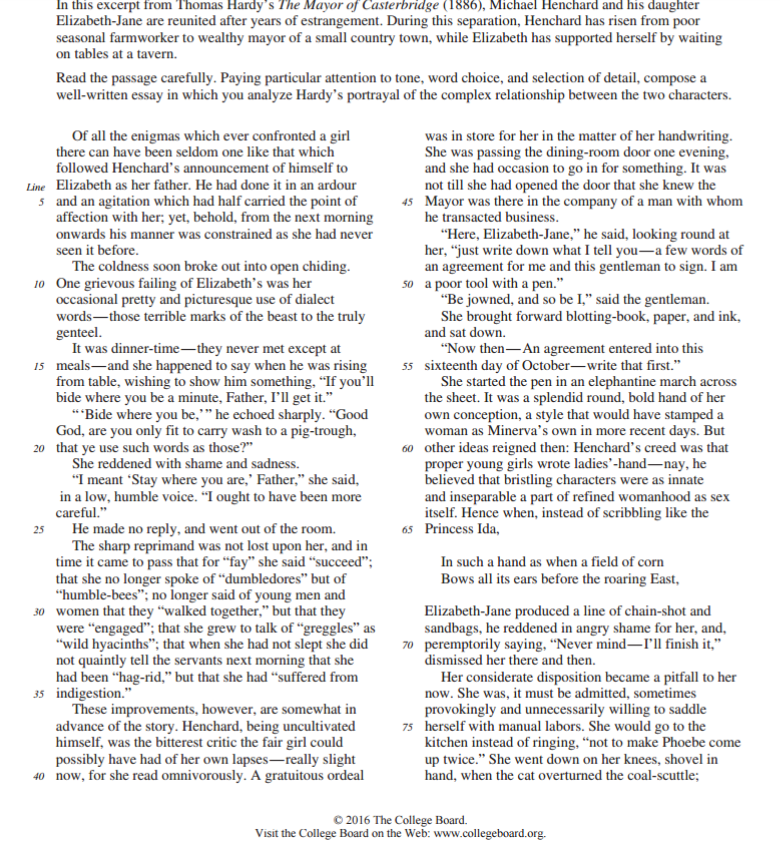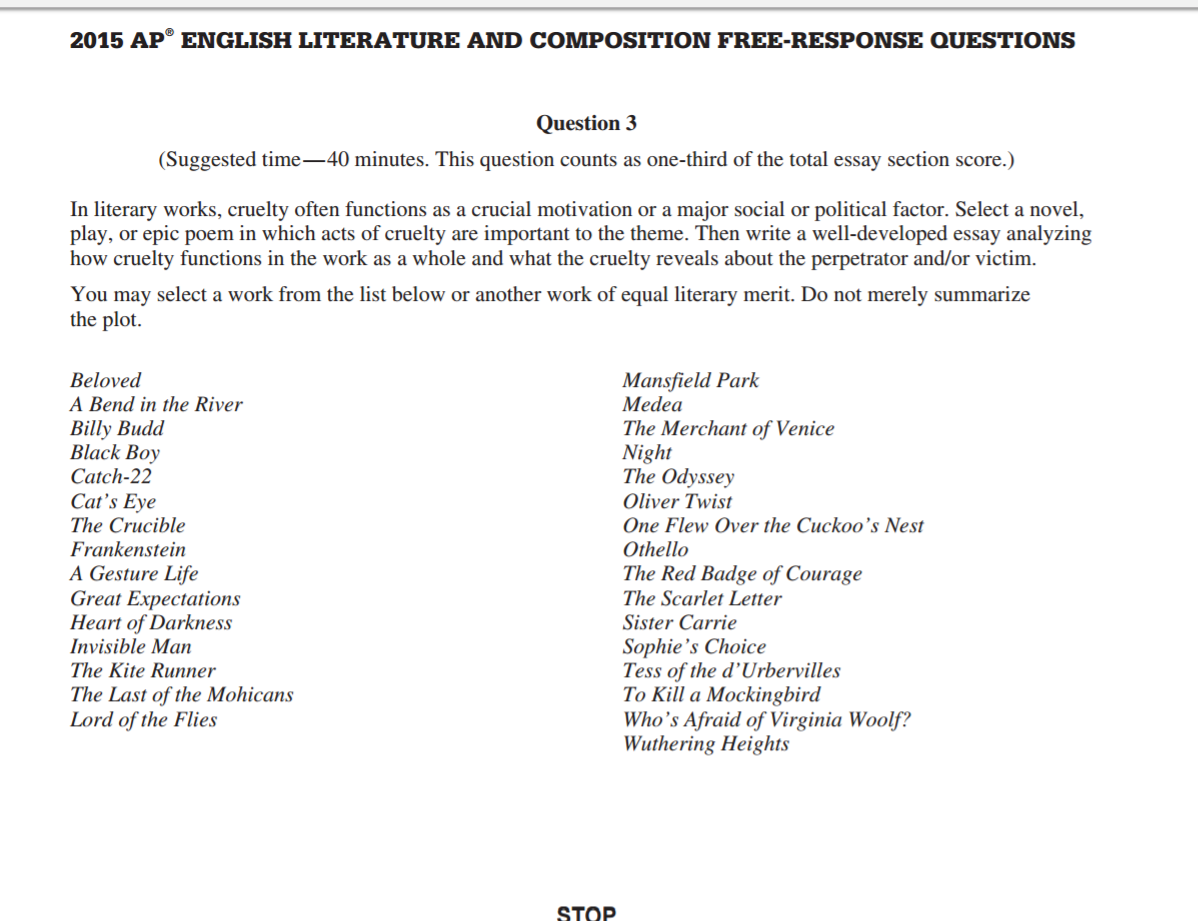How to Write a Good Ap Lit Essay
Attention:This post was written a few years ago and may not reflect the latest changes in the AP® program. We are gradually updating these posts and will remove this disclaimer when this post is updated. Thank you for your patience!
As we approach AP® exam time, you'll want to explore how to best prepare yourself for the AP® English Literature free-response section of the exam. Free-response makes up 55% of your test score. In this section, you will write three essays regarding prompts from poetry, a selected passage, and a work of literary fiction you select.
Only 7.6% of AP® English Literature students scored a 5, in 2016. Follow this AP® English Literature study plan to improve your chances of a possible 5 on this year's test. Included herein are best practices for studying, practice exams, and tips on writing extraordinary essays.
What is the Format of AP® English Literature?
The goal of the AP® English Literature course is to familiarize students with complex literary works of fiction. Through analytical reading and a careful attention to detail, students learn critical analysis of creative writing. Writing is an integral part of the course and exam. Essay assignments focus on the critical analysis of provided literary works and can be expository, analytical or argumentative.
The exam takes 3 hours. It is comprised of three free-response essays and 55 multiple-choice questions. The free-response section accounts to 55% of your score.
You will be given two hours to complete three free-response essays. The first will be corresponding to a given poem. The second will be regarding an excerpt from prose fiction or drama. The third is centered around a literary work chosen by you, from a specified category.
Why is the AP® English Literature Free-Response Important?
Scoring guidelines for the AP® English Literature Exam show that essays are assigned grades from 1-9. A 9 is the best score possible. Each of your scores is then multiplied by 3.0556. This weighted score is added to your multiple-choice totals, and the sum is your score. Overall scores ranging 114-150 are required for a 5 on the AP® English Literature Exam.
If you score a perfect 68 on the multiple-choice portion, you would need three solid 5's on your essays to earn a 5, on your overall exam. Since, it's unlikely for anyone to achieve a perfect multiple-choice score, you should aim higher on the free-response questions.
A reasonable goal to strive for, would be earning 7's on your essays. This would allow you to earn a 5 for your overall score by answering 40 MCQs correctly.
What Content is Covered in the Free-Response Section of AP® English Literature?
For the AP® English Literature Free-response section you are required to write three essays. They may be argumentative, analytical or expository depending on instructions. This section tests your ability to read and interpret various literary works, as well as your ability to communicate your ideas in a stylized, coherent response.
The test questions and subject matter change yearly, however, the structure remains the same. There will be one poem, one passage from prose fiction (or drama), and one work that you choose from a given category. Each fictional work will be accompanied by a question that you must answer in your essay. These range from specific interpretation of a given line or literary device used, to overall understanding of a writer's purpose, theme or style.
Literature represented may span the 18th to 20th centuries. Poets such as John Keats, Walt Whitman, and Gwendolyn Brooks are possible examples. In drama, you may see the likes of Samuel Beckett, Sophocles, or Tennessee Williams. And, in expository prose, you'll find authors such as Gloria Anzaldua, George Orwell, or Edward Said.
Return to the Table of Contents
How to Prepare for AP® English Literature Free-Response

Managing your time, as the AP® exams grow closer, is imperative if you want a perfect score. There are many resources available online to help get the most from your AP® English Literature study plan, both on Albert.io and CollegeBoard. Whether you're natural at writing and comprehending literature, or not, you'll want to prepare for the coming exam. Here are some quick tips to help you get the most out of study sessions.
Practice Makes Perfect
You can find released exams and sample essays from previous years, on CollegeBoard. On Albert.io there are a multitude of helpful study resources including 15 Must Know Rhetorical Terms For AP® English Literature, AP® English Literature; 5 Essential Reads, and practice free-response essays for various works. If you'd like to follow a specific route the One Month AP® English Literature Study Guide is helpful and comprehensive.
Focus on Critical Reading
Critical reading is essential for any AP® English Literature review. It's important to never skim through passages while studying. You will miss underlying themes and subtext which are important for answering the AP® English Literature practice questions.
Always read at a normal pace in practice and during your exam. Repeat or elaborate passages to ensure you've understood them. Consider the following question as you read, "What is the meaning of this sentence, paragraph, stanza, or chapter?"
Utilize Your Syllabus
At the beginning of the year, collect as many of the books, poems and other works assigned for your AP® English Literature course as you can. This will allow you to read at your own pace and save valuable time looking for assigned texts as they come up.
Take Notes as You Read
When reviewing any book, poem, essay or other literary work take careful notes which, can be used later. Include the exact title, author's name and a paraphrasing of the preface or introduction. Also note important themes, styles, and content. When recording specific ideas related to a particular part include page, paragraph, and line number for easy re-examination at a later date.
Carefully Consider Principal Ideas
Take into account the key concepts in any reading assignment. What evidence or support does the author show? In the writings of journalists, identifying these ideas and reinforcing materials is easy. However, accomplishing the same task for a more subtle work, such as that of Sylvia Plath or F. Scott Fitzgerald, may prove challenging.
Explore the Context
Spending a short amount of time researching the context surrounding an author or their work can expand your understanding of issues they tried to address and how well they succeeded. For example, researching Berlin in 1935 will give you insight to better understand the motivations of Vladimir Nabokov, when he wrote The Gift.
Read out Loud
When reading complex passages or poetry it is helpful to read aloud. Often, this approach slows your reading and aids in your comprehension of underlying tones and themes.
Reread when Necessary
It is regularly advised to read a literary work more than once to fully understand complex issues and sophisticated expressions.
Consult Your Dictionary, Thesaurus or Encyclopedia
Take advantage of these invaluable resources at your local library or online to expand your knowledge of words and content that you are reading. Remember that many English and American texts require familiarity with the major themes of Judaic and Christian religious traditions and with Greek and Roman mythology.
Write, Review, and Rewrite Regularly
Writing quality essays takes practice. It's not an innate ability we are born with. Proper use of vocabulary, grammar, and syntax are just as important as understanding the literature you're analyzing. Refer to How To Score Your Own AP® English Literature Practice Essay to review and improve your writing. For an in depth review of free-response strategies turn to 3 Ways to Tackle AP® English Literature Prompts. Use of the Albert.io AP® English Literature free-response practice questions will be invaluable to your study plan.
Return to the Table of Contents
How to Answer AP® English Literature Free-Response Questions?

Here are some basic guidelines for writing a cohesive free-response essay. For more specific details on writing an exemplary response, check out How to Score Your Own AP® English Language Practice Essay. Also, head over to 11 AP® English Literature Test Taking Strategies for exam insight.
Understand the Subject Matter
Before you begin formulating your answer, read the prompt and any corresponding passage thoroughly. Ensure you fully comprehend what is being asked of you.
Outline Your Essay
Begin answering any free-response question with a quick outline of your planned essay. An effective introduction will include a thesis statement. Your thesis statement and supporting ideas should be clear and well thought out. Remember to structure your points and end with a conclusion which summarizes your answer.
Write Clearly and Eloquently
As you craft your response pay special attention to structure, vocabulary, and grammar. A well written essay is essential. Be certain to answer the presented question fully with supporting evidence from the passage provided. Ensure that your tenses are in line, pronoun use is not messy, and read your essay for fluidity as you go. Conclude by restating your thesis and summarizing your argument.
What are AP® English Literature Free-Response Questions Like?
The following are actual free-response questions from AP® English Literature Exams of the past years. You can find many more released questions and responses on CollegeBoard, for reference.
Example One is from the 2016 exam.
"In this excerpt from Thomas Hardy's The Mayor of Casterbridge (1886), Michael Henchard and his daughter Elizabeth-Jane are reunited after years of estrangement. During this separation, Henchard has risen from poor seasonal farm worker to wealthy mayor of a small country town, while Elizabeth has supported herself by waiting tables at a tavern.
Read the passage carefully. Paying particular attention to tone, word choice, and selection of detail, compose a well-written essay in which you analyze Hardy's portrayal of the complex relationship between the two characters."


When reading the passage, pay special attention to the relationship between the two characters. Note specific lines which give particular insight. Formulate your opinion and structure your essay to support it. A well-written response for this prompt would understand the many nuisances seen in this excerpt. Notable points to mention in an effective essay include the underlying hypocrisy of Henchard, the unhealthy relationship between the characters and the paradox wherein Elizabeth-Jane tries in vain to relate to her father, causing her own pain.
Take a look at some past responses for this prompt and the scores on CollegeBoard's 2016 Scoring Guidelines.
Example two is from the 2015 exam.
"In literary works, cruelty often functions as a crucial motivation or a major social or political factor. Select a novel, play, or epic poem in which acts of cruelty are important to the theme. Then write a well-developed essay analyzing how cruelty functions in the work as a whole and what the cruelty reveals about the perpetrator and/or victim.
You may select a work from the list below or another work of equal literary merit. Do not merely summarize the plot."
Some of the choices given included Beloved, Oliver Twist, The Scarlet Letter, and The Crucible.
Select one of the given options or your own, based on your confidence that you remember and understand the plot, characters and details well enough to write a convincing and sophisticated essay. Examine how cruelty plays a role in the story, what that means for the victim and/or perpetrator, and any underlying themes which relate to cruelty. Use specific examples from the piece and support your argument clearly.

Take a look at a few past responses from this prompt and the scores on CollegeBoard's 2015 Scoring Guidelines.
Return to the Table of Contents
How Can I practice AP® English Literature Free-Response?
As you continue to prepare yourself for the AP® English Literature free-response portion of the exam, take advantage of the many resources cited herein. Also, look on Albert.io for helpful AP® English Literature practice questions, study tips and essay guides.
Don't forget to check the quality of your writing as you practice by self-scoring your practice responses. Check out How to Score Your Own AP® English Literature Essay for help.
Looking for AP® English Literature practice?
Kickstart your AP® English Literature prep with Albert. Start your AP® exam prep today.
How to Write a Good Ap Lit Essay
Source: https://www.albert.io/blog/how-to-approach-ap-english-literature-free-response-questions/